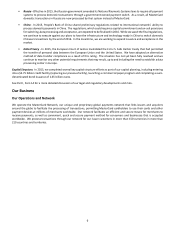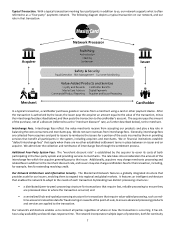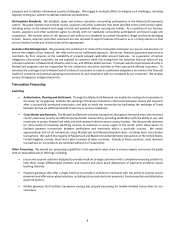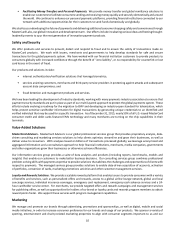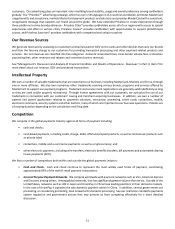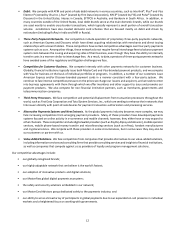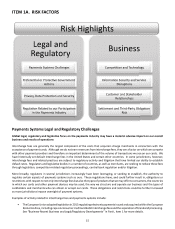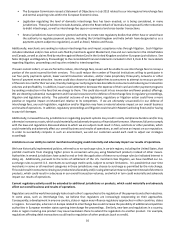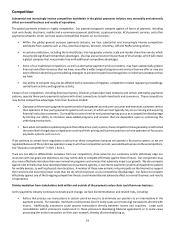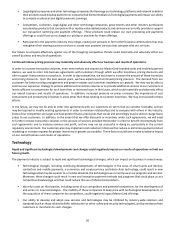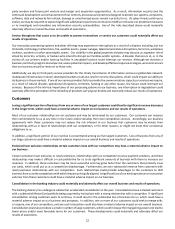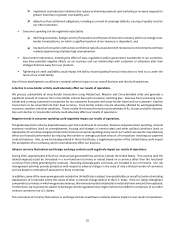MasterCard 2015 Annual Report Download - page 22
Download and view the complete annual report
Please find page 22 of the 2015 MasterCard annual report below. You can navigate through the pages in the report by either clicking on the pages listed below, or by using the keyword search tool below to find specific information within the annual report.16
• The European Commission issued a Statement of Objections in July 2015 related to our interregional interchange fees
and central acquiring rules within the European Economic Area.
• Legislation regulating the level of domestic interchange fees has been enacted, or is being considered, in many
jurisdictions. These jurisdictions include Australia, where the Reserve Bank of Australia has proposed further reductions
to debit interchange, as well as interchange fee caps on commercial and cross-border transactions.
• Several jurisdictions have created or granted authority to create new regulatory bodies that either have or would have
the authority to regulate payment systems, including the United Kingdom and India (which have designated us as a
payments system subject to regulation), as well as Brazil, Mexico and Russia.
Additionally, merchants are seeking to reduce interchange fees and impact acceptance rules through litigation. Such litigation
includes individual and/or class action suits filed by merchants against MasterCard, Visa and our customers in the United States
and Canada, as well as claims filed by retailers against MasterCard in the United Kingdom and other European jusrisdictions. See
Note 18 (Legal and Regulatory Proceedings) to the consolidated financial statements included in Part II, Item 8 for more details
regarding litigation, proceedings and inquiries related to interchange fees.
If issuers cannot collect, or we are forced to reduce, interchange fees, issuers will be unable to use interchange fees to recoup a
portion of the costs incurred for their services. This could reduce the number of financial institutions willing to participate in
our four-party payments system, lower overall transaction volumes, and/or make proprietary three-party networks or other
forms of payment more attractive. Issuers could also choose to charge higher fees to consumers to attempt to recoup a portion
of the costs incurred for their services, thereby making our card programs less desirable to consumers and reducing our transaction
volumes and profitability. In addition, issuers could attempt to decrease the expense of their card and other payment programs
by seeking a reduction in the fees that we charge to them. This could also result in less innovation and fewer product offerings.
We are devoting substantial management and financial resources to the defense of interchange fees in regulatory proceedings,
litigation and legislative activity. The potential outcome of any legislative, regulatory or litigation action could have a more
positive or negative impact on MasterCard relative to its competitors. If we are ultimately unsuccessful in our defense of
interchange fees, any such legislation, regulation and/or litigation may have a material adverse impact on our overall business
and results of operations. In addition, regulatory proceedings and litigation could result in MasterCard being fined and/or having
to pay civil damages.
Additionally, increased focus by jurisdictions on regulating payment systems may result in costly compliance burdens and/or may
otherwise increase our costs, which could materially and adversely impact our financial performance. Moreover, failure to comply
with the laws and regulations discussed above to which we are subject could result in fines, sanctions or other penalties, which
could materially and adversely affect our overall business and results of operations, as well as have an impact on our reputation.
In order to successfully compete in such an environment, we and our customers would each need to adjust our strategies
accordingly.
Limitations on our ability to restrict merchant surcharging could materially and adversely impact our results of operations.
We have historically implemented policies, referred to as no-surcharge rules, in certain regions, including the United States, that
prohibit merchants from charging higher prices to consumers who pay using MasterCard products instead of other means.
Authorities in several jurisdictions have acted to end or limit the application of these no-surcharge rules (or indicated interest in
doing so). Additionally, pursuant to the terms of settlement of the U.S. merchant class litigation, we have modified our no-
surcharge rules to permit U.S. merchants to surcharge credit cards, subject to certain limitations. It is possible that over time
merchants in some or all merchant categories in these jurisdictions may choose to surcharge as permitted by the rule change.
This could result in consumers viewing our products less favorably and/or using alternative means of payment instead of electronic
products, which could result in a decrease in our overall transaction volumes, and which in turn could materially and adversely
impact our results of operations.
Current regulatory activity could be extended to additional jurisdictions or products, which could materially and adversely
affect our overall business and results of operations.
Regulators around the world increasingly look at each other’s approaches to the regulation of the payments and other industries.
In some areas, such as interchange fees, we believe that regulators are increasingly cooperating on their approaches.
Consequently, a development in any one country, state or region may influence regulatory approaches in other countries, states
or regions. For example, a decision in Europe related to interchange fees could increase the possibility of additional competition
authorities in European member states opening interchange fee proceedings. Similarly, new laws and regulations in a country,
state or region involving one product may cause lawmakers there to extend the regulations to another product. For example,
regulations affecting debit transactions could lead to regulation of other products (such as credit).


